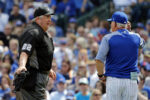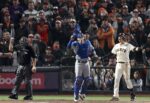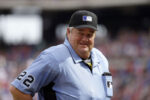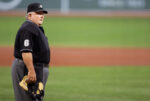 There are many adages in sports about how games are allowed to be played. In some instances when we get to championship playoffs, more often than not whistles are pocketed and referees “let the players play” so the game’s outcome be determined by the participants and not the officials. While the NFL offered an apology after a blown call resulted in a team losing a playoff game, baseball is way past needing a revisiting of rules, especially in playoff games where death-by-umpire has profound effects on teams and careers.
There are many adages in sports about how games are allowed to be played. In some instances when we get to championship playoffs, more often than not whistles are pocketed and referees “let the players play” so the game’s outcome be determined by the participants and not the officials. While the NFL offered an apology after a blown call resulted in a team losing a playoff game, baseball is way past needing a revisiting of rules, especially in playoff games where death-by-umpire has profound effects on teams and careers.
Two immediately come to mind so far during the current Major League Baseball playoff rounds: one a check swing called a game-ending strike three and a blown call that should have ended an inning but instead gave a good team a second chance….
 With two outs in the bottom of the ninth inning and the Giants trailing 2–1, Gabe Morales called a decisive third strike on an apparent check swing by Giants infielder Wilmer Flores, resulting in a strikeout that ended San Francisco’s 107-win season. The Giants had a runner on first base. After Max Scherzer’s pitch—a slider out of the strike zone—home plate umpire Doug Eddings signaled to Morales for help on the call. Morales determined that Flores went far enough around for a strike, but video showed that he checked his swing.
With two outs in the bottom of the ninth inning and the Giants trailing 2–1, Gabe Morales called a decisive third strike on an apparent check swing by Giants infielder Wilmer Flores, resulting in a strikeout that ended San Francisco’s 107-win season. The Giants had a runner on first base. After Max Scherzer’s pitch—a slider out of the strike zone—home plate umpire Doug Eddings signaled to Morales for help on the call. Morales determined that Flores went far enough around for a strike, but video showed that he checked his swing.
— Sports Illustrated, 10/15/21
Laz Diaz made a strike call so bad on Tuesday night that he let Alex Cora come out and scream about it without ejecting the Boston manager. If only Cora and Boston knew what was to come later on in the evening.
 In the top of the ninth inning, with Game 4 of the ALCS between the Red Sox and Astros tied at 2-2, Nathan Eovaldi was looking to pitch out of his own jam and end his relief appearance with a curveball to pinch hitter Jason Castro. Eovaldi threw the perfect pitch, and he began his walk to the dugout. Only the strike three call from Diaz never came. The umpire called it ball two. Two pitches later, Castro ripped Eovaldi’s 88 mph splitter into center field, driving in what proved to be the winning run of the ballgame.
In the top of the ninth inning, with Game 4 of the ALCS between the Red Sox and Astros tied at 2-2, Nathan Eovaldi was looking to pitch out of his own jam and end his relief appearance with a curveball to pinch hitter Jason Castro. Eovaldi threw the perfect pitch, and he began his walk to the dugout. Only the strike three call from Diaz never came. The umpire called it ball two. Two pitches later, Castro ripped Eovaldi’s 88 mph splitter into center field, driving in what proved to be the winning run of the ballgame.
— CBS Boston, 10/20/21
Before a suggestion is presented, a couple issues need be addressed.
One question is why baseball umpires are allowed to make so many mistakes during the course of a game, let alone the season?
 The MLB Umpire Union is more powerful than the NBA’s , NFL’s and NHL’s officials because their level of accountability has a significant chasm between MLB Umpires Union and the other league’s officials. For instance, MLB home plate umpires are “allowed” to determine their “own strike zone” but every other major sport has a strict adherence to the established rules and those officials are constantly “graded” to ensure a higher quality is maintained. Those officials in the other leagues not meeting this passing grade, soon find themselves replaced by more qualified officials. Only the highest graded officials (by the governing body and coaches) are allowed to officiate playoff and championships games. MLB allows their officials to participate at the championship levels strictly on a rotational basis where there minimal incentives to be graded the “best” and be rewarded for extra bonuses for officiating these playoff and W.S. Games.
The MLB Umpire Union is more powerful than the NBA’s , NFL’s and NHL’s officials because their level of accountability has a significant chasm between MLB Umpires Union and the other league’s officials. For instance, MLB home plate umpires are “allowed” to determine their “own strike zone” but every other major sport has a strict adherence to the established rules and those officials are constantly “graded” to ensure a higher quality is maintained. Those officials in the other leagues not meeting this passing grade, soon find themselves replaced by more qualified officials. Only the highest graded officials (by the governing body and coaches) are allowed to officiate playoff and championships games. MLB allows their officials to participate at the championship levels strictly on a rotational basis where there minimal incentives to be graded the “best” and be rewarded for extra bonuses for officiating these playoff and W.S. Games.
— Terence Imai, Quora
I originally found that insightful answer while trying to see if their was a clinical correlation between very visual obesity and umpires of questionable performance. Imai continued….
 The other sports requires their officials to cover a larger field of play along with having to constantly be in motion either running or skating to ensure all infractions are identified and properly accessed in a timely matter. Baseball officials only cover a relatively smaller area and their fitness is not required when compared to the other sports.
The other sports requires their officials to cover a larger field of play along with having to constantly be in motion either running or skating to ensure all infractions are identified and properly accessed in a timely matter. Baseball officials only cover a relatively smaller area and their fitness is not required when compared to the other sports.
Yeah, no shit.
So, the million dollar could be “Could obesity affect eyesight” especially when it comes to MLB umpires?
Umpires aren’t specifically addressed because no one appears to have asked the Union, possibly for good reason….
 Studies show that obesity increases the risk of serious eye diseases, including diabetic retinopathy, wet macular degeneration and glaucoma.
Studies show that obesity increases the risk of serious eye diseases, including diabetic retinopathy, wet macular degeneration and glaucoma.
— Optometrists.org
Among different eye diseases, obesity has been linked with age-related cataract, glaucoma, age-related maculopathy, and diabetic retinopathy. Numerous population-based and prospective studies support an association between obesity and risk of age-related cataract. There is strong evidence that obesity is associated with elevated intraocular pressure, but there is no convincing data to support a more direct association between obesity and glaucomatous optic neuropathy.
—– National Institutes of Health
The nation’s twin epidemics of obesity and diabetes are beginning to rob more Americans of their sight, a new study in The Journal of the American Medical Association shows. Researchers defined impairment as anything worse than 20/40 vision that can’t be corrected with glasses, a problem that disqualifies people from driving in many states.
— USA Today, 12/10/12
If you decide to do a deeper dive, you’ll find news stories of umpires who’ve passed away and you can guess what a consistent cause was.
So as long as we retain that “human element”, we’ll have bad calls in sports. But that’s not to say the damage can’t be minimized.
One Possible Remedy…?
How about during MLB playoff games from the ninth inning on, every pitch is subject to review AFTER the second strike has been called. That way, someone monitoring in New York can push a button and a red light comes on, stopping play on the field while that ball or strike is reviewed. Heaven forbid an egregious blown call potentially affect the outcome of a game or season. Sure, it will add a few more minutes to a game but with so much on the line, every effort should be made to assure the calls are correct.
Is that too much to ask?

